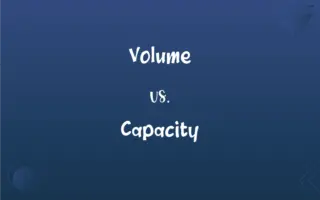Hazard vs. Disaster: What's the Difference?
Edited by Aimie Carlson || By Harlon Moss || Updated on August 6, 2024
A "hazard" is a potential source of harm or danger, while a "disaster" is a sudden, catastrophic event causing significant harm or loss.

Key Differences
A "hazard" and a "disaster" are two terms deeply intertwined within the realm of risk management and emergency response. A "hazard" generally refers to any potential source of harm or adverse health effect on a person or persons. On the other hand, a "disaster" typically implies a sudden and catastrophic event that causes significant disruption, harm, or loss, often on a large scale.
For instance, consider a dormant volcano. While it poses a potential risk or "hazard" to nearby communities due to its inherent nature, it only becomes a "disaster" when it erupts and causes damage to life, property, and the environment. It's the actualization of the hazard that leads to the disaster.
Delving further, one might recognize that all disasters stem from hazards, but not all hazards lead to disasters. A chemical plant might be a "hazard" due to the potential for leakage or explosion, but a "disaster" only occurs if there's an actual leak or explosion that results in harm. Hence, preparedness often focuses on minimizing the conversion of hazards into disasters.
Another perspective is the sphere of predictability. While "hazards" can often be predicted, monitored, and sometimes even controlled, "disasters" are often sudden and can't be controlled once they occur. It's the after-effects and the mitigation of disasters that become the focal point.
In essence, the concepts of "hazard" and "disaster" are sequential. Hazards represent potential threats, and disasters are the unfortunate realizations of some of those threats.
ADVERTISEMENT
Comparison Chart
Definition
Potential source of harm or danger
Sudden, catastrophic event causing significant harm/loss
Predictability
Can often be predicted and sometimes controlled
Typically sudden and uncontrollable once they occur
Result
Doesn't necessarily lead to adverse outcomes
Always leads to significant adverse outcomes
Example
Dormant volcano, chemical plant
Volcanic eruption, chemical plant explosion
Relationship
Represents potential threats
Actualizations of some of those threats
ADVERTISEMENT
Hazard and Disaster Definitions
Hazard
A risk or danger in a specific situation.
Investing in that startup is a financial hazard.
Disaster
A sudden, catastrophic event causing significant harm.
The earthquake was a major disaster for the city.
Hazard
A chance; accident.
By hazard, they met at the same cafe.
Disaster
A complete failure or fiasco.
The party turned into a disaster when the music system failed.
Hazard
A potential source of harm or danger.
The wet floor was a slipping hazard.
Disaster
A sudden or great misfortune.
The crop failure was a disaster for farmers.
Hazard
An obstacle in sports, especially golf.
The golfer tried to avoid the water hazard.
Disaster
An event or situation causing widespread destruction or distress.
The product launch was a marketing disaster.
Hazard
To expose to danger or risk.
He hazarded his savings on a risky venture.
Disaster
An event leading to grave consequences.
The bridge collapse was a disaster for commuters.
Hazard
A chance of being injured or harmed
Space travel is full of hazards.
Disaster
An occurrence causing widespread destruction and distress; a catastrophe.
Hazard
Risk or danger
A high degree of hazard.
Disaster
A grave misfortune.
FAQs
Can we predict "disasters"?
While we can predict some "disasters" based on "hazard" monitoring, many are sudden and unpredictable.
Is a "hazard" always physical?
No, "hazards" can be physical, chemical, biological, ergonomic, or even psychosocial.
Are man-made events considered "disasters"?
Yes, both natural and man-made catastrophic events can be termed "disasters".
Can a "hazard" be beneficial in some contexts, like in sports?
Yes, in sports like golf, a "hazard" is a challenging obstacle, adding intrigue to the game.
Is every "disaster" large-scale?
No, "disasters" can vary in scale, from localized events to large-scale catastrophes.
How do we recover from a "disaster"?
Recovery involves rebuilding, rehabilitation, and ensuring long-term preparedness.
Can a situation be both a "hazard" and a "disaster"?
A situation starts as a "hazard", and if it leads to significant harm, it becomes a "disaster".
How does one minimize the impact of a "disaster"?
Through preparedness, response strategies, and mitigation based on understanding potential "hazards".
How often do "disasters" occur?
"Disasters" can be rare or frequent depending on the type and region.
How do governments handle "hazards"?
Governments often have "hazard" monitoring and control mechanisms to prevent potential "disasters".
How are "hazards" and "disasters" related to insurance?
Insurances often cover damages from certain "disasters" and are priced based on "hazard" assessments.
Is a "hazard" always harmful?
A "hazard" represents potential harm but doesn't always result in harm.
Are all "disasters" natural?
No, "disasters" can be both natural (like earthquakes) and man-made (like industrial accidents).
How can individuals prepare for "hazards"?
By staying informed, creating emergency plans, and taking preventive measures based on potential "hazards".
Does every "hazard" lead to a "disaster"?
No, not every "hazard" culminates in a "disaster".
Why is it essential to understand "hazards" in a region?
Understanding "hazards" helps in effective planning, construction, and disaster preparedness.
Do "disasters" always come without warning?
Some "disasters", like tornadoes, may have little warning, while others, like hurricanes, can be predicted days in advance.
Can "hazard" be used as a verb?
Yes, "to hazard" can mean to risk or venture.
Is "hazard" synonymous with "risk"?
They're related, but "hazard" is a potential harm source, while "risk" is the likelihood of that harm occurring.
What makes a "disaster" particularly severe?
The severity of a "disaster" depends on its impact on life, property, environment, and economy.
About Author
Written by
Harlon MossHarlon is a seasoned quality moderator and accomplished content writer for Difference Wiki. An alumnus of the prestigious University of California, he earned his degree in Computer Science. Leveraging his academic background, Harlon brings a meticulous and informed perspective to his work, ensuring content accuracy and excellence.
Edited by
Aimie CarlsonAimie Carlson, holding a master's degree in English literature, is a fervent English language enthusiast. She lends her writing talents to Difference Wiki, a prominent website that specializes in comparisons, offering readers insightful analyses that both captivate and inform.






































































